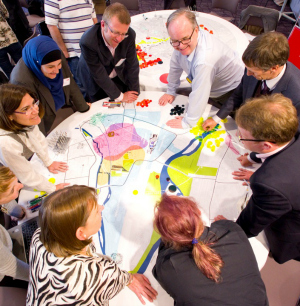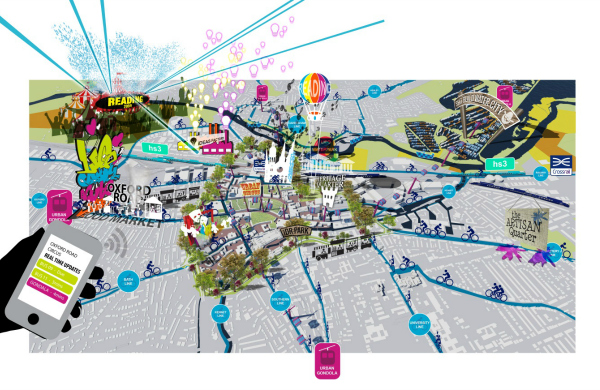Guest post by Professor Tim Dixon, University of Reading, on the Reading 2050 vision developed as part of the Foresight Future of Cities project.
Although Reading is not yet officially a ‘city’ it forms part of one of the most economically vibrant and connected urban areas in the UK. This presents big challenges in maintaining its competitive edge and dealing with the important environmental and socio-economic issues arising from its continued economic growth. Developing a Reading 2050 vision which is both ‘smart’ and ‘sustainable’ is an important step in supporting longer term planning and development in Reading.
Reading’s geographic location at the confluence of the Thames and Kennet rivers, and its location 40 miles west of London explain the ancient origins of its success as a trading centre and centre of commerce and manufacturing. Historically it was renowned for its ‘beer, biscuits, bulbs and bricks’, and Reading has a strong history founded on the legacy of Reading Abbey and other historic sites.
Today, with a population of 155,700 (or 310,000 for the Reading/Wokingham Urban Area), Reading is a major commercial and retail centre, and home to many leading multinational high tech companies. Reading is also one of the top 5 ‘city’ economies in the UK, with a strong track record in inward investment and economic growth. Reading’s success is based on its physical and virtual networks in an increasingly globalised world. It is also a classic example of an ‘under-bounded’ urban area, where its administrative boundary is smaller than its wider urban footprint.
Developing a smart and sustainable 2050 vision

Working with Barton Willmore and Reading UK CIC, the University of Reading ran a workshop in May 2014 which was attended by more than 50 invited delegates from Reading and its wider area. Attendees included major employers, local authorities, academics, investors, entrepreneurs, planning experts and a wide range of Reading stakeholders. The aim of the workshop was to take the first steps towards developing a smart and sustainable vision for Reading UK 2050.
We adapted the visioning tools we used in Cardiff and Manchester from our EPSRC Retrofit 2050 work, and used a participatory 'backcasting' approach, supported by ‘roadmaps’ and ‘postcards from the future’. This was based on imagining a 2050 future as a starting point, and helped us structure the discussions around:
- people and lifestyle
- place and environment
- economy and employment
To develop the Reading UK 2050 vision we combined elements of a smart city with those of a sustainable city. This was because Reading already has a long term aim to be ‘low carbon’ by 2050 through its climate strategy, but also because it has a strong technology and green technology focus in its existing economy.
As a result of the workshop we distilled emerging themes into 3 scenarios. These are not mutually exclusive but they help frame some of the main ideas, and draw on the strengths and opportunities unique to Reading:
- 'City of Festivals': Reading as a city with a rich heritage and culture and new civic spaces
- 'City of Rivers': Reading focusing on its riverside heritage and innovating in energy and water technologies
- 'Green Tech City': Reading becomes a centre for green and innovative thinking and low carbon technologies

More work is required to flesh out these proposals and build on our work to date. This is not a masterplan but rather the start of a process which we hope to continue to evolve. We will be focusing our efforts on communicating and working with business, the local authorities, the local enterprise partnership (LEP) and other stakeholders to further develop the vision. In the short term we feel it is important to:
- establish a clear vision and identity – the process we have started is the start of that journey
- create a Reading Futures 2050 Group – to help drive a new Reading 2050 vision
- join up thinking around ‘Greater Reading’
- improve transport and infrastructure
- create innovative partnership and joint funding models
The work we are doing for Reading 2050 is an example of a co-created project, and other cities throughout the UK are working with a range of partners to develop visions as part of the Foresight Future of Cities programme. As the vision for Reading evolves we will be developing other activities, not only based around workshops and design competitions, but also connecting through to the new Happy Museums project in Reading, which will also explore the past, present and future of Reading.
Let us know your thoughts in the comments below.
Featured image by David Merrett on Flickr. Used under Creative Commons. All other images courtesy of Reading 2050.
Sign up for email alerts from this blog, or follow us on Twitter.
